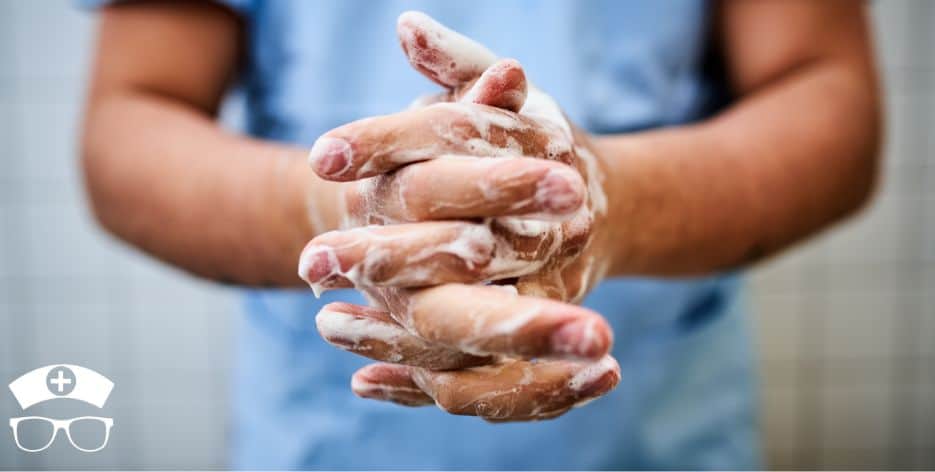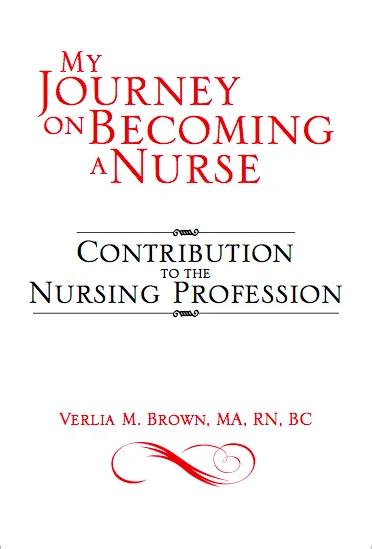Having gloves on, using soap, alcohol-based sanitizers, and other disinfectants all take a toll on your skin. If you consistently overlook this as a nurse, your hands will likely become coarse over the course of a few months, and lose the nourished look they had when you first began.
In this article, you’ll get the lowdown on the hurdles nurses encounter when they let hand care slip, along with some handy tips crafted specifically for nurses to help keep your skin silky smooth.
Table of Contents
Common Hand Care Problems for Nurses
When nurses neglect hand care, we can encounter several issues. Constant hand washing (with soap or hot water) and exposure to sanitizers and disinfectants can lead to dryness, roughness, and even skin irritation. Without proper care, hands become chapped, cracked, or sore, affecting not only your comfort but also your ability to provide effective patient care. This can also lead to severe skin problems.
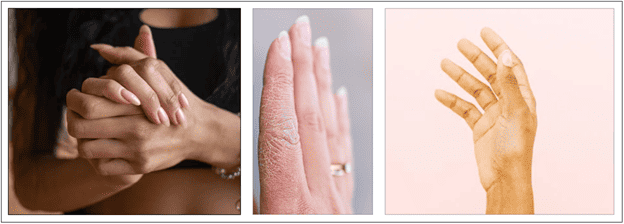
How Does Washing Your Hands Make Them Dry? Isn’t Water Wet?
When you wash your hands with soap, it removes the natural oils and moisture from your skin, making it feel dry and rough. This can be especially true if you use soap that has harsh ingredients or if you wash your hands frequently (which basically all nurses do).
Hand Sanitizer’s Effect on Your Hands
Hand sanitizers typically contain a high amount of alcohol (60%-90%) or antibacterial agents like triclosan that have a drying effect on your skin. When you apply hand sanitizer multiple times each day, it’s constantly taking moisture out of your skin. This ends with skin that is dry, flaky, and sensitive to the touch. And interestingly enough, cracked and dried-out hands make it easier for bacteria and germs to get inside the body.
So what’s the solution? Heal those dry, rough, or damaged hands. So let’s talk about treatment.
How Can a Nurse Restore Dry and Damaged Hands?
There are many different ways to restore moisture back to dry hands. Maintaining the natural protective mechanism can only be achieved when your hands are conditioned and protected regularly with creams and other complimentary efforts, to ensure the entirety of the hand is looked after.
1. Start With Hand Creams for Basic Hand Care
Hand creams are the quickest way for nurses to treat their hands. Our hands have different skin vibes going on compared to the rest of the body. The skin on the top is kind of thin with very few oil glands, so it tends to get dry fast. And on the flip side (literally), the palms have thicker skin, so keeping them moisturized requires rich, moisture-packed cream, so slathering on face creams or serums won’t do the trick most of the time.
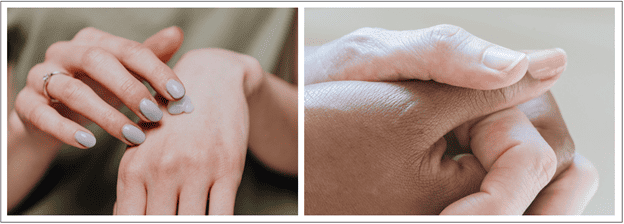
Hand creams work their magic in three cool ways, they nourish, protect, and repair your skin. They are thick and packed with more oil, therefore diving deep into your skin to provide intense nourishment. They mix emollients (softeners), occlusives (oily, moisturizing, and protective coating), and humectants (water boosters) to keep the hands silky and smooth. The occlusives keep moisture locked in, humectants up the hydration, and emollients give your skin that soft, protective hug.
2. Use Protective Gloves Daily
Gloves act as a physical protective barrier. You should wear gloves while performing tasks that involve exposure to water, chemicals, or harsh conditions. This is a preventative measure that protects your hands from irritants and helps retain moisture.
3. Steam Your Hands Once a Week
A steaming session is a no-cost hand care trick. Grab a bowl of hot steamy water and place your hands over it for a thorough treatment. This softens rough hands by removing dead skin cells. Finish it off with some hand lotion or petroleum jelly to keep the moisture locked in.
4. Egg Yolk Remedy Thrice a Week
The next alternative for dry hands is an egg yolk. Grab an egg, crack it open, apply it on both of your hands, and let it dry for about 30 minutes. Rinse off with a mild soap, and you will feel a change in the texture of your palm and hand.
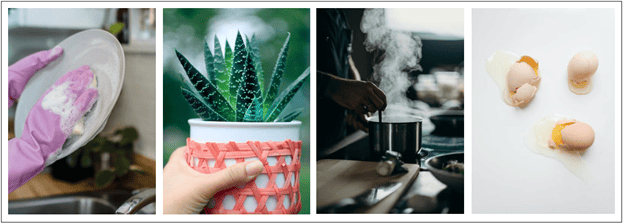
5. Aloe Vera: A Natural Hand Care Solution
This green, gooey magic is a natural skin healer because of its antibiotic and anti-inflammatory qualities. The gel from its leaves is packed with vitamins A, C, and E, making it an amazing moisturizer. Scoop out a generous dollop and spread it over your hands (leave it on for half an hour) for a natural and safe moisture boost.
6. Get a Manicure Once a Month
Treat yourself (you’re a nurse, you deserve it) and go to a nail salon in your neighborhood and get a good, old-fashioned manicure! A basic one typically involves soaking, trimming, and buffing. You can also take advantage of options like hand massages or paraffin treatments to further soften rough hands.
How Does Diet Affect Your Skin?
Now that you know what you can do externally, let’s look at how a well-balanced diet complements this. These approaches together create a comprehensive strategy to ensure your hands not only feel but also look their best. The food you eat has a big effect on how your skin looks and feels. In general, fruits and vegetables are good choices because they have skin-friendly vitamins and other antioxidants.

How Nutrients Boost the Skin’s Glow
Proteins
Your body turns the proteins you eat into building blocks called amino acids and reuses them to make other proteins, including collagen and keratin that form the structure of the skin.
Fats
Fats can help your skin glow. More specifically, Omega-3 fatty acids help your skin stay strong, supple, and well moisturized. You can get fat from nuts, seeds, avocados, and fish.
Vitamin A
Vitamin A helps limit the appearance of fine lines and wrinkles. It also can increase the rate at which skin repairs and heals itself. Beef liver, sweet potatoes, carrots, spinach, pumpkin, and salmon are some of the richest sources of vitamin A.
Vitamin C
Vitamin C is a well-known antioxidant that plays a role in building collagen. It can also limit UV sun damage (but it isn’t a substitute for sunscreen).. Guava, bell peppers, strawberries, oranges, kiwi, and broccoli are the best sources of vitamin C.
Vitamin E
Vitamin E is an antioxidant that has protective effects regarding UV rays (also not a substitute for sunscreen). It helps heal sunburned skin, which is why you see it included as an ingredient in many sunburn relief creams and gels. Almonds, sunflower seeds, hazelnuts, and sunflower oil are all excellent sources of vitamin E.
Zinc and Selenium
Zinc acts as an antioxidant, helps your skin heal after injury, and keeps the cell wall stable. Meanwhile, selenium is a part of the antioxidant enzymes, protects the skin from oxidative damage, and helps maintain elasticity. They both ensure your complexion stays fresh and supple. Oysters, beef, pumpkin seeds, lentils, and cashews are enriched with zinc, while Brazil nuts, sunflower seeds, fish (tuna, halibut), turkey, eggs, and spinach are all rich sources of selenium.

The Diet that Radiates Health and Beauty
- Fatty fish like salmon, sardines, and tuna – they are not just delicious but pack a punch with protein, omega-3s, and selenium.
- Leafy dark greens such as kale, spinach, and collard greens are a rich source of vitamins A, C, and E, as well as omega-3s and protein. Spinach also contains selenium.
- Eggs are a wholesome source of proteins, along with vitamins A and E, selenium, and zinc.
- Flax seeds are a plant-based powerhouse that offers omega-3 fatty acids and selenium.
- Legumes, including lentils and chickpeas, provide a protein boost along with zinc.
- Avocados, known for their healthy fats, also deliver vitamins C and D.
- Extra virgin olive oil, a staple in many diets, offers healthy fats and vitamin E.
Conclusively, your skin speaks volumes about what you feed it, so load up on the good stuff, and let it radiate health. Now, let’s talk about finding the perfect hand cream.
Hand Care Products that Nurses Should Use
Finding the perfect hand cream is a whole quest; first you have to trust the company, then dig into the ingredients, and make sure it’s worth every penny. And let’s be real, getting that combo of trust, quality, and not burning a hole in your pocket is like finding a needle in a haystack.

These 7 Best Hand Creams for Nurses will help you navigate the hand cream jungle and find some gems that’ll have your hands saying, “Thank you!”, without you having to empty your wallet.
Now you know what to do when your hands need extra care, know some of the science behind it, and have an idea of some of the best hand creams you can get. Let’s discuss the last milestone of this battle; making good hand care a habit.
How Can Nurses Develop a Hand Care Routine?
Even after finding the perfect creams for your hands, getting into a regular hand care routine can be tricky. But you can do little things that will help you develop a solid hand care routine.

- Switch up your phone wallpaper.
- Schedule “Me Time” reminders.
- Put an alarm on your phone to remind you of your nightly hand care routine.
You can change your phone wallpaper to a friendly reminder to apply hand cream or set a designated “hand care time” for a brief hand care session. Cap off your day with a nightly hand care routine just before bed. This way, your hands get ample time to soak in the goodness and heal while you sleep.
From the external care offered by creams and other things to the internal support provided by a nutritious diet, every, single step contributes to the well-being of your hands. So, go ahead, pamper your skin, nourish your body, and revel in the transformation!

